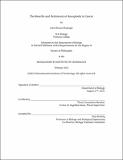The Benefits and Detriments of Aneuploidy in Cancer
Author(s)
Replogle, John Michael
DownloadThesis PDF (10.50Mb)
Advisor
Amon, Angelika
Terms of use
Metadata
Show full item recordAbstract
Aneuploidy, defined as having a chromosome number that is not a multiple of the organism’s haploid number, is a hallmark of cancer. This creates an imbalanced karyotype, where the copy number of hundreds or thousands of genes is altered. About 90% of solid tumors and 70% of blood cancers are aneuploid.
How does aneuploidy affect cancer cells? These copy number alterations affect expression at the RNA and protein level, which causes numerous problems for cells. Aneuploidy increases genomic instability, both through higher rates of DNA damage and causing more chromosome missegregation. The proteome is also significantly challenged; excess proteins aggregate or must be degraded and stress chaperones and the proteasome. These stresses culminate in slow proliferation, particularly through G1 of the cell cycle, relative to euploid cells.
However, evidence is growing for the ways that aneuploidy benefits cancer cell fitness. Aneuploidy is associated with poor patient survival in cancer. In chapter 2, this dissertation describes another effect of aneuploidy: increased resistance to a wide variety of drugs. The slower proliferation of aneuploid cells is the predominant mechanism that protects them from some of the most common chemotherapeutics used today. When proliferation rate is equal between euploid and aneuploid cells, the chemotherapy resistance caused by aneuploidy mostly disappears; however, there is also some evidence for aneuploidy-induced-chemotherapeutic-resistance not explained by the cell cycle defects of aneuploidy. Beyond drug resistance, aneuploidy may benefit cancer cell fitness in other ways: there is growing, but still mixed, evidence that aneuploidy may promote immune-evasion of tumors and increase metastasis. This dissertation discusses the current evidence for how aneuploidy may provide advantages to a cancer cell.
Outside of cancer, several chromosomal disorders exist, including Down syndrome, which may be better understood through aneuploidy. The appendix of this dissertation explores aneuploidy-tolerance and how trisomy 21 cells can relieve their proliferation deficit. A CRISPR screen for improved growth of trisomy 21 cells identified several genes of interest that may specifically contribute to proliferation of trisomy 21 cells. Ultimately, more work is needed to understand how these genes of interest interact with aneuploidy and trisomy 21 to affect proliferation.
Date issued
2022-02Department
Massachusetts Institute of Technology. Department of BiologyPublisher
Massachusetts Institute of Technology